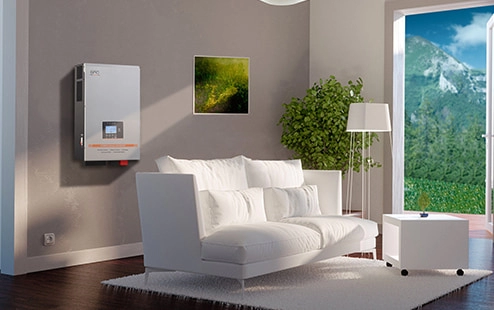Solar energy has emerged as one of the most popular and sustainable energy solutions for both homeowners and businesses. However, while solar panels are great at capturing sunlight and converting it into electricity, there’s a catch: the energy they produce is in the form of direct current (DC), while most of our appliances and the electrical grid operate on alternating current (AC). This is where solar inverters come in. These unsung heroes of solar systems play a critical role in converting DC power into usable AC power, ensuring that solar energy is not only efficient but also practical for everyday use. Beyond just conversion, solar inverters optimize performance, enhance safety, and make solar energy a reliable and sustainable choice.

Solar panels generate electricity in DC form, but most homes and businesses run on AC power. This mismatch means the energy produced by solar panels can’t be used directly. Enter the solar inverter, which bridges this gap by converting DC power into AC power. Without this conversion, the energy harnessed by your solar panels would essentially go to waste, leaving your appliances, lights, and electronics powerless. The inverter ensures that the solar energy you generate is compatible with your home’s electrical system, making it a seamless part of your daily life.
To get the most out of your solar energy system, efficiency is key. Solar inverters use a technology called Maximum Power Point Tracking (MPPT) to ensure your solar panels are always operating at their peak performance. Factors like sunlight intensity, temperature, and weather conditions can cause fluctuations in energy output. MPPT technology continuously adjusts the system to keep it running at maximum efficiency, no matter the conditions. This means you’re always getting the most energy possible from your solar panels, maximizing your investment.
Many solar systems are connected to the electrical grid, and grid-tied inverters play a crucial role in making this connection smooth and safe. These inverters synchronize the solar system’s output with the grid’s voltage and frequency, ensuring seamless integration. This synchronization also enables net metering, a system that allows you to send excess solar energy back to the grid. In return, you earn credits that can offset your electricity bill when your solar panels aren’t producing enough power, like at night or on cloudy days. It’s a win-win for both your wallet and the grid.
Safety is a top priority in any energy system, and solar inverters come equipped with features to protect both your home and the grid. For instance, anti-islanding protection automatically disconnects your solar system from the grid during a power outage. This prevents your system from sending power to the grid, which could pose a risk to utility workers repairing the lines. Additionally, modern inverters have built-in fault detection that can identify issues like overloads, short circuits, or overheating, helping to prevent damage and extend the lifespan of your system.
Today’s solar inverters often come with advanced monitoring capabilities, allowing you to keep tabs on your system’s performance in real time. Through a smartphone app or online dashboard, you can track how much energy your panels are generating, how much you’re using, and how much is being sent back to the grid. This data makes it easy to spot any issues, such as shading, dirty panels, or inverter malfunctions, so you can address them quickly. By staying on top of your system’s performance, you can ensure it’s always running at its best.
One of the biggest advantages of solar inverters is their role in helping you achieve energy independence. By converting solar energy into usable AC power, inverters reduce your reliance on the grid. When your solar panels produce more energy than you need, the excess can be sent back to the grid, earning you credits that lower your electricity bills. Over time, this can lead to significant savings, especially during peak usage times. In some cases, you might even generate enough credits to cover your energy needs when your panels aren’t producing, like at night or during winter months.
For those looking to take their energy independence a step further, many solar inverters now support battery storage systems. These inverters can direct excess solar energy into batteries instead of sending it back to the grid. This stored energy can then be used when your panels aren’t producing enough power, like at night or during outages. If your batteries are fully charged, the inverter can send any additional energy back to the grid. This flexibility gives you greater control over your energy usage and further reduces your dependence on grid electricity.
Solar inverters aren’t just good for your wallet—they’re good for the planet, too. By optimizing solar energy production and ensuring its efficient use, inverters help reduce reliance on fossil fuels and lower greenhouse gas emissions. This makes them a key player in the global shift toward renewable energy and a more sustainable future. For homeowners and businesses looking to reduce their carbon footprint, investing in a high-quality solar inverter is a smart and impactful choice.
Our solar inverters are the backbone of any solar energy system, quietly working behind the scenes to make solar power practical, efficient, and safe. They convert DC power into AC power, optimize energy production, enable grid synchronization, and provide essential safety features. With real-time monitoring, support for battery storage, and the ability to lower electricity bills, inverters are a critical component in maximizing the benefits of solar energy. Whether you’re looking to save money, reduce your environmental impact, or achieve greater energy independence, solar inverters are an indispensable part of the equation. They’re not just a piece of technology—they’re a gateway to a cleaner, greener future.